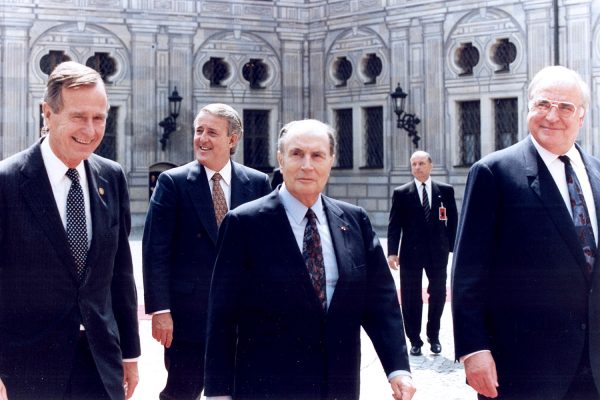
Reflections on George H.W. Bush’s legacy have generally emphasized his commitment to the transatlantic alliance and its benign consequences for Europe’s post-Cold War transition. Lost in the narrative is the former president’s ambivalence toward the restive movements on the outer edges the Soviet empire.
The result was a full-blown civil conflict in Yugoslavia that undermined America’s confidence in its European allies and fueled a unilateralist streak that would animate a decade of American-led interventions.
European role
Toward the latter half of 1991, Croatia and Slovenia moved toward independence, fully aware that breaking away could lead to a Serbian invasion and the outbreak of regional war on the borders of Italy and Greece.
The crisis in Yugoslavia came at a time when the West was divided on the future of NATO. Prominent strategists in the United States were throwing their support behind Europeanist ambitions. In a noted article in International Security, Charles and Clifford Kupchan argued that NATO should “cede increasing responsibility” to a pan-European “concert-based collective security organization”.
Even others less enthused by the prospect of Europe developing independent military capabilities viewed the breakdown of the transatlantic alliance as an eventuality.
President Bush was wary, fearing that European efforts to forge a common security role would undercut NATO and by extension Washington’s voice in the continent’s affairs. Over French objections, he forged consensus for a Rapid Reaction Corps under integrated NATO command, which would allow the alliance to undertake missions “out of area”.
“We don’t want to put a dog in this fight”
When Serbia’s Slobodan Milošević — convinced NATO would not stand in his way — ordered the Yugoslav army into Croatia and Slovenia in the spring of 1991, the American failure to prevent the war emboldened the European Community to forge an independent path.
Speaking on behalf of the then-twelve member states, Luxembourg’s foreign minister, Jacques Poos declared, “This is the hour of Europe, not the hour of the Americans… If one problem can be solved by the Europeans, it is the Yugoslav problem. This is a European country and it is not up to the Americans.”
President Bush was content to leave the problem to the Europeans. “I’ve told our top people, ‘We don’t want to put a dog in this fight,'” he wrote in his diary on July 1. “It’s not one that we have to mastermind… This concept that we have to work out every problem, everywhere in the word, is crazy.”
The United States agreed to coordinate transatlantic consultations on Yugoslavia through channels with the European Community. The North Atlantic Cooperation Council defined the conflict in Yugoslavia as “out of area”, and thus outside NATO’s scope.
On the sidelines
Bush’s decision to remain on the sidelines made this the first major issue in Western security since the Suez crisis in which the United States had not taken the lead. In a 1994 article in Foreign Affairs, the president’s National Security Council director for Europe and Eurasia, David Gompert, confirmed this was by design:
George Bush and his lieutenants studied the facts and concluded that leadership in this crisis would have had major drawbacks for the United States. Following the Gulf War, a leading role in Yugoslavia would have implied that the United States could and would act as international policeman, even in an area of more immediate importance to America’s rich European partners.
The consequences of an absent American policeman — the worst atrocities on the European continent since World War II — ultimately proved too much for the country’s conscience to bear. The United States led a NATO intervention in Bosnia four years later and in Kosovo another four years later. The lesson it learned: when it came to strategic and humanitarian interests, the New World could not rely on “old Europe”.
